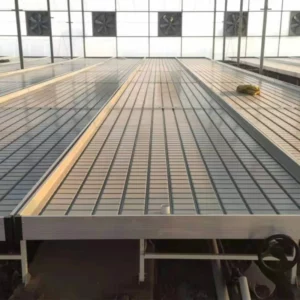Ebb and Flow Tables, also known as flood and drain tables, are a hydroponic system component used in controlled environment agriculture. These tables consist of a tray filled with a growing medium where plants are placed, and a system for periodically flooding and draining the table with nutrient-rich water.
The use of Ebb and Flow Tables contributes to sustainable farming practices in several ways:
- Water Efficiency:
- Controlled water usage: Ebb and Flow Tables use a recirculating system, allowing for the efficient use of water. Nutrient-rich water is cycled through the table, and any excess is collected and reused. This reduces water wastage compared to traditional soil-based farming or less controlled hydroponic systems.
- Nutrient Efficiency:
- Precise nutrient delivery: The nutrient solution used in Ebb and Flow Tables can be precisely controlled and adjusted to meet the specific needs of the plants. This targeted nutrient delivery maximizes nutrient absorption by the plants, reducing the overall amount of nutrients required and minimizing nutrient runoff.
- Energy Efficiency:
- Controlled environment: Ebb and Flow Tables are often used in conjunction with controlled environment agriculture, such as greenhouses or indoor farming setups. These environments allow for better control of temperature, humidity, and light conditions. By optimizing these factors, energy consumption can be reduced, contributing to overall energy efficiency.
- Space Utilization:
- Vertical farming potential: Ebb and Flow Tables can be integrated into vertical farming systems, making efficient use of limited space. Vertical farming reduces the need for expansive horizontal land, potentially preventing deforestation and preserving natural habitats.
- Reduced Soil Erosion:
- Soil-free system: Hydroponic systems like Ebb and Flow Tables operate without soil. This eliminates concerns related to soil erosion,China Ebb And Flow Table supplier which is a common issue in traditional farming practices. The absence of soil erosion helps maintain soil health and prevents the runoff of sediments into water bodies.
- Year-Round Production:
- Seasonal independence: Ebb and Flow Tables, when combined with controlled environments, allow for year-round production. This reduces the reliance on seasonal weather conditions and extends the growing season, contributing to a more consistent and sustainable food supply.
- Reduced Pesticide Use:
- Controlled environment benefits: In controlled environments associated with Ebb and Flow Tables, pest and disease pressures can be minimized. This can lead to a reduction in the need for pesticides, promoting environmentally friendly and sustainable farming practices.
- Recyclability and Reusability:
- Materials and water reuse: The materials used in Ebb and Flow Tables can often be recycled, and the water in the system is recirculated. This reduces the demand for new resources and minimizes waste, contributing to a more sustainable farming model.
By incorporating Ebb and Flow Tables into a controlled environment agriculture system, farmers can optimize resource use, minimize environmental impact, and enhance overall sustainability in food production.
